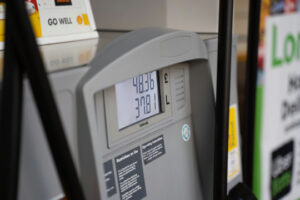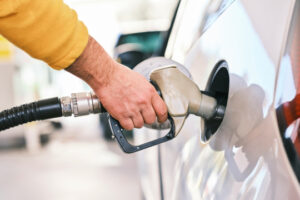With gas prices on the constant rise with no end in sight, saving gas when filling our vehicles has become a primary concern and a top priority for many drivers. Fortunately, there are several approachable and effective methods to help increase your vehicle’s fuel efficiency and save you money at the pump.
By adopting these cost-conscious practices, you can make positive strides in reducing your fuel consumption while also helping minimize your carbon footprint. Here are eight simple ways to save gas.
 1. Maintain Proper Tire Pressure
1. Maintain Proper Tire Pressure
Driving with under-inflated tires can increase your fuel consumption by up to 3%. To maximize your vehicle’s fuel efficiency, regularly check your tire pressure to ensure they are inflated to the appropriate level. Properly inflated tires not only improve fuel efficiency but can also extend the life of your tires.
2. Smooth and Steady Driving
Aggressive driving behaviors such as rapid accelerations, speeding, and hard braking can all significantly reduce your vehicle’s fuel efficiency. Driving at a consistent and moderate speed, anticipating stops and starts, and avoiding unnecessary acceleration and braking are all effective measures to save gas while on the road.
3. Reduce Your Idle Time
As far as ways to save gas go, cutting down your idling time is one of your easiest options. Idling is a significant waste of gas and contributes to unnecessary and harmful emissions. If you anticipate being stopped for periods of more than a minute, such as at a railroad crossing or a long traffic light, it is often far more fuel-efficient to switch off your engine and restart it once you are ready to get moving again.
You should also consider turning off your car if you plan to be parked for a while, such as while waiting for a friend in a parking lot, picking up your child from school, or waiting in a long line at a fast food restaurant.
4. Utilize Cruise Control
Shifting to cruise control while on the highway can help you maintain a steady speed and can work wonders to improve your fuel efficiency. Cruise control helps prevent unnecessary speed fluctuations and can result in significant gas savings, especially during long road trips.
 5. Avoid Bearing Excessive Weight
5. Avoid Bearing Excessive Weight
Carrying excessive amounts of weight in your vehicle can reduce fuel efficiency and can be harmful to your brakes. When possible, try removing any unnecessary items from your trunk and avoiding using the roof racks or carriers unless necessary, as they can significantly increase aerodynamic drag and reduce gas mileage.
6. Keep Your Vehicle Well-Maintained
Regular maintenance, tune-ups, oil changes, and air filter replacements can help improve your vehicle’s fuel efficiency. A well-maintained engine operates more efficiently and uses less fuel.
7. Use the Right Grade of Motor Oil
Always using the manufacturer’s recommended grade of motor oil is crucial for gas mileage and fuel efficiency. High-quality synthetic oils can help reduce friction damage and improve engine performance, resulting in better gas mileage.
 8. Plan Your Trips Wisely
8. Plan Your Trips Wisely
Streamlining your tasks and errands and wisely planning your routes are essential measures for avoiding unnecessary driving time. Combining multiple stops into one concise trip can save a considerable amount of gas and reduce your overall mileage.
Similarly, choosing the time of day can help you avoid traffic. Weekends, weekday lunchtime, and rush hour tend to see a considerable influx of traffic on Atlanta freeways, so consider scheduling your errands around these time windows. Additionally, you may consider carpooling or utilizing public transportation if possible to help further conserve fuel consumption.
Conclusion
Saving gas does not need to be overly complicated. By adopting these eight simple ways to save gas, you can help increase your vehicle’s fuel efficiency, save money, and reduce your environmental impact and carbon footprint.
Remember, implementing these minor yet positive changes in your driving habits and vehicle maintenance can lead to significant savings over time. Begin incorporating these practical tips today to experience a more fuel-efficient and cost-effective driving experience.










Leave a Reply
You must be logged in to post a comment.